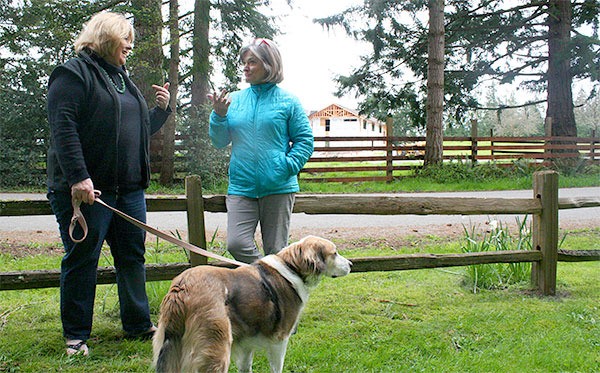A new group is aiming to put a cork on regulations that would allow large events at wineries, functions they say disrupt their quality of life.
And members of the group say they’re not happy with the commissioner who championed it.
Neighbors Interested in Common-sense Economics, or NICE, say that Commissioner Helen Price Johnson tried to push through ordinance changes last month without proper public input because of a personal connection she has with the winery Comforts of Whidbey.
WHILE CONCEDING that she’s known Comforts of Whidbey owners, Carl and Rita Comfort, for years, Price Johnson said she did not press for the changes for them alone.
“I can’t figure it out,” said Maro Walsh, a spokesman for the 20 or so neighbors of Comforts of Whidbey who comprise NICE.
“They’re old friends?” Walsh questioned. “She keeps saying, ‘My community wants this.’ Only one winery wants this. Why is she pushing it so much when it’s the only winery that wants it?”
Allowing rural event centers to have large-scale events and weddings has drawn the ire of neighboring residents over the years because of the noise and traffic. As a quick fix, commissioners approved a temporary rural event center permit to allow more time to address the issue within the larger comprehensive plan update, due in 2016.
DURING A work session last month, Price Johnson argued for proposed ordinance changes that would allow for winery-specific rural events and clean up “inconsistencies” in the county’s code dealing with wineries.
The Comforts hired Larry Kwarsick, a former planning director who now operates a private consulting firm, to assist them with writing the code changes that were proposed to the Island County Planning Commission and later the county commissioners.
At least two other wineries were sent the code for review.
After a heated discussion, Price Johnson’s proposal to update the county’s winery regulations was voted down by the other two commissioners, Jill Johnson and Rick Hannold.
PRICE JOHNSON said Friday that that her argument for making changes to the winery code was largely misunderstood because she was simply trying to change a very small part of the code, not make the sweeping changes proposed by the Comforts.
Price Johnson said she has a “stack of public input on the issue,” and that it’s “disingenuous to make this about the Comforts.”
Johnson said she believes that “extreme changes” were proposed that are more than simple code changes.
“What I saw was definitely Comp Plan worth conversations,” Johnson said.
Price Johnson said Friday that she has known the Comfort family for years.
With nearly all of Whidbey Island’s wineries contacted, many said they have no interest in holding weddings or events on their property. Two wineries said it is only a longer term plan for them.
“We’re set up for it, but it’s not something in our business plan,” said Greg Martinez of Holmes Harbor Cellars. But the ordinance changes are “something we’re following.”
GREG OSENBACH, owner of Whidbey Island Winery, said he might be interested in hosting weddings at some point, but not at the expense of neighbors.
“You can’t survive without the support of your community,” Osenbach said. He added that he was “kind of disturbed” that the normally good relationship between wineries and their neighbors appears to be “under siege” at the Comfort winery.
Comfort said Thursday that he started reaching out for neighbor support when he hosted his first two weddings in 2012. The following year they hosted seven weddings and one last year.
“We were very cognizant of the noise in all directions,” Comfort said, leading them to begin construction last year of a large indoor space they hope will help mitigate the noise.
WALSH SAID she and her neighbors initially supported the Comforts and rural events at wineries, but did not like being left out of the process.
When neighbors tried to reach out to Comfort by email, their efforts resulted in “long combative replies,” according to Walsh.
With the new Comfort construction, Walsh said, NICE believes the additional space will simply mean louder, larger-scale weddings, and that the Comforts are using the new winery regulations to work around more stringent requirements for rural event centers.
COMFORT SAID that he and his wife looked into becoming a rural event center early on, but realized that the requirements would not address the needs of a winery.
Comfort said his intention in submitting the updated language was to create a starting point for the county to work on. He said it may have been “naive” to think that the process would be simple.
COUNTY PLANNING Director David Wechner said code is generally written by county staff and reviewed by attorneys unless a resident wants to file for a change.
“The ‘regular route’ is to file a comp plan amendment application and fee when an individual wants to propose a code change,” Wechner said.
“I’d venture to say we’re more the experts in constructing and implementing code language.”
Karen Krug, owner of Spoiled Dog Winery, sits on the county Planning Commission. While not interested in holding large-scale events, she said clarification of the winery ordinances is necessary.
What was proposed “is not really inconsistent for what wineries do in other parts of the state,” Krug said. “It’s not out of the box.”



